Is Spray Foam Insulation Flammable In Fort Collins?
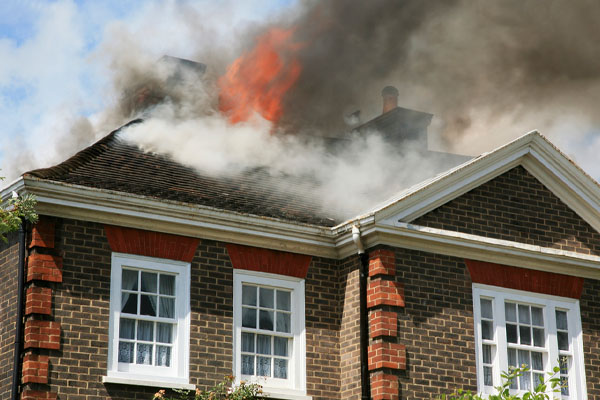
Spray foam is one of the most popular home insulation options. It is easy to see why, with its excellent thermal resistance and sound-dampening properties. It even creates an airtight seal that improves indoor air quality and reduces air drafts. If you have the budget for it, then there is no reason why you can’t use spray foam for your home.
Safety issues might make you pause, including questions about flammability. One question we are asked often is, “Is spray foam insulation flammable?”. It is a valid concern, so let’s discuss this in detail in this Ascend Construction article to put your mind at ease. We will also touch on proper installation and its role in keeping you safe.
The Flammability of Insulating Materials
Contents
- The Flammability of Insulating Materials
- The Importance of Professional Assessment
- Why Proper Ventilation Matters with Spray Foam Insulation
- Spray Foam Insulation: Common Questions
- What Are the Key Benefits of Spray Foam Insulation?
- How Does Spray Foam Compare to Other Insulation Materials?
- Can Spray Foam Insulation Be Used in All Areas of a Home?
- Does Spray Foam Insulation Have Any Health Risks?
- How Long Does Spray Foam Insulation Last?
- What Should Homeowners Consider When Choosing a Spray Foam Installer?
- Conclusion
- Contact Ascend Construction for Expert Insulation Services in Fort Collins
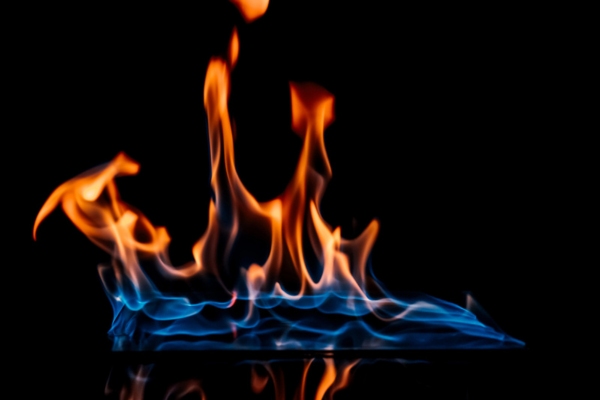
Staying indoors can be uncomfortable when extreme temperatures strike. HVAC systems may help, but they have their limits. If you want to enjoy year-round comfort, then you should increase the insulation along your home’s thermal envelope. However, you must be careful about selection and installation.
No insulation material can be classified as truly fireproof. Given the right conditions, most can catch fire and inflict damage. For example, cellulose, open and closed spray foam, and other foam plastic materials are flammable. Others will melt and transfer heat to their surroundings, such as mineral wool and multi-foil.
Enhance Your Home’s Energy Efficiency: Improve insulation, reduce drafts, and lower energy costs with Ascend Construction’s expert insulation and air sealing services. Call today!
Why Insulation Remains a Safe Option
Don’t let the flammability of insulation make you fearful. These will not randomly burst into flames. They are not like paper that will almost instantly catch fire upon contact. In fact, spray foam insulation will need to be heated to 700 degrees before you see flames. Manufacturers are also enhancing the production process for safety.
They are treating the foam with fire retardant chemicals to minimize the danger. With high-quality spray foam, you can have superior heat resistance, indoor air quality, and noise reduction while staying safe.
Fire Resistant vs Fire Retardant: A Definition
You might get confused about the terms that you read. Many may look like they are referring to the same thing, but there are important differences. Let us clear things up right now to aid you in choosing the ideal insulation for your home.
A material is considered “fire resistant” if it can inherently shrug off the fire. It is self-extinguishing, so you don’t need to worry about flames. On the other hand, a “fire retardant” is a material that can slow down ignition thanks to chemical treatments. This can prevent burning and may lead to a self-extinguished fire.
A fire-resistant material reacts quickly, extinguishing flames within two seconds. It should also be under six inches for arc protection and under four inches for flash fire protection. Remember that fire is powerful, and no material is completely immune to it. Some will burn while others will melt. However, fire-resistant materials can delay ignition significantly and give you time to move to safety. The same is true for fire retardant chemical treatments. Since most types of insulation are flammable, your main concern should be their flame spread rating. You should also heed the safety recommendations for each type.
Protect Your Home with Fire-Safe Insulation: Get high-quality insulation treated with flame retardants for added safety and efficiency. Contact Ascend Construction today!
The Fire Rating of Spray Foam Insulation
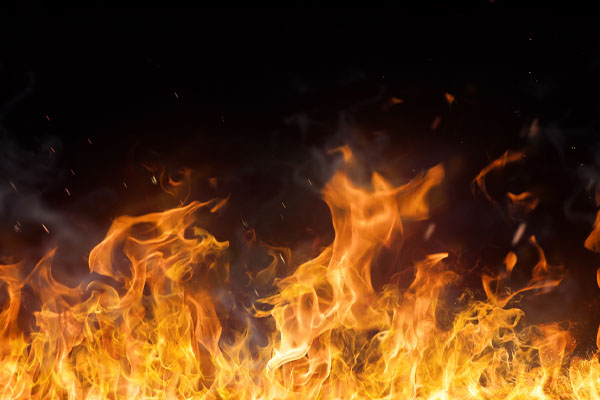
When it comes to the flame spread rating, lower is always better. Class A materials have a fire rating between 0 and 25, including brick, fiber cement, and gypsum wallboard. These are unlikely to add fuel to fire. Class B materials have a fire rating between 26 and 75, examples of which are wood planks directly taken from trees.
Lastly, Class C materials have a fire rating between 76 and 200, including plywood, hardboard, and fiberboard. It would be nice to have Class A insulation for safety, but you may not get the thermal protection you want. Class B insulation may offer a good balance.
Spray foam has a flame spread rating of 75. This puts it firmly in the mid-pack with other Class B materials. It’s not so bad, considering that it has a better rating than common construction options like plywood and fiberboard.
Although it is flammable, it can resist fire for about one hour. That should provide ample time for people in a home or building to get out of harm’s way. Nearly all the foam insulation available today contains some type of flame retardant. The treated material will help prevent the spread of fire.
Professional Spray Foam Installation: Ensure safe and effective spray foam insulation with Ascend Construction’s expert team. Schedule your consultation now!
Why Spray Foam Requires A Fort Collins Insulation Professional
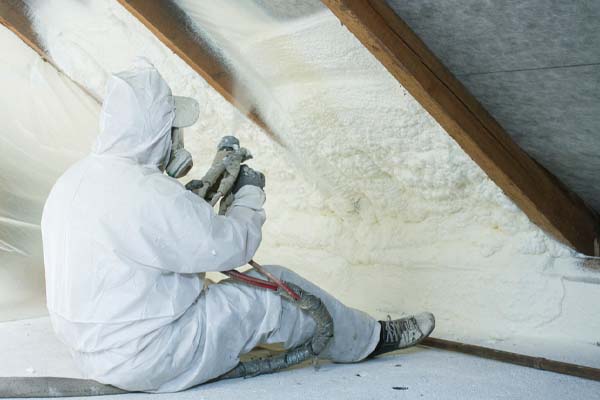
If you are planning DIY spray foam installation, think again. It may save you a few bucks, but it exposes you to unnecessary risks. Note that spray foam generates heat during installation so you need to be careful about it. If the layers are applied too thick or piled too soon, then the material may end up charring, smoldering, or even burning. The odds are low, but the recorded cases should serve as a warning to everyone. Let a professional insulation contractor handle the installation for your peace of mind.
Upgrade Your Home’s Comfort and Performance: From insulation removal to whole-house fan installations, Ascend Construction has the expertise you need. Call now to get started!
The Importance of Professional Assessment
Before installing spray foam insulation, it’s crucial to assess your home’s specific needs. Factors such as climate, building structure, and existing ventilation all influence the effectiveness and safety of insulation. A professional contractor can evaluate these conditions and recommend the best type of insulation and installation approach. By working with an expert, homeowners can maximize energy efficiency, improve indoor air quality, and ensure compliance with local building codes.
Why Proper Ventilation Matters with Spray Foam Insulation
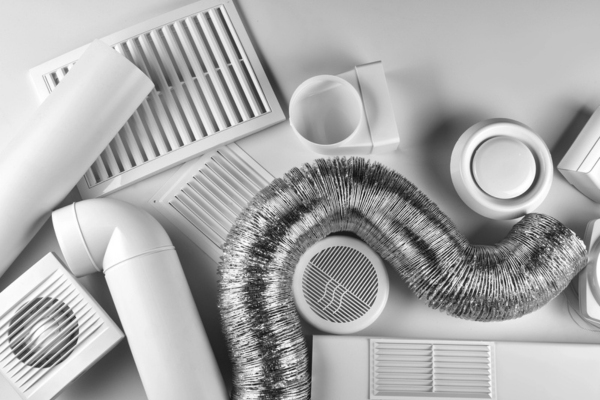
While spray foam creates an airtight seal that improves energy efficiency, it also reduces natural airflow in your home. Without proper ventilation, this can trap moisture and indoor pollutants, potentially leading to mold growth or poor air quality. To counter this, homeowners should ensure their home has adequate ventilation systems, such as mechanical ventilation or air exchangers, to maintain fresh air circulation.
A professional insulation contractor can assess your home’s needs and recommend solutions that balance insulation performance with proper airflow, ensuring a comfortable and healthy indoor environment.
Upgrade Your Home’s Insulation for Lasting Comfort: Improve thermal resistance and indoor air quality with our expert insulation solutions. Schedule your appointment today!
Spray Foam Insulation: Common Questions

What Are the Key Benefits of Spray Foam Insulation?
Spray foam insulation offers multiple advantages beyond just thermal resistance. It creates an airtight seal, which improves indoor air quality by reducing allergens and moisture infiltration. It also helps lower energy bills by minimizing heat loss and gain. Additionally, spray foam enhances soundproofing, making homes quieter by reducing outside noise. These benefits make it a preferred choice for many homeowners, especially in regions with extreme temperatures.
How Does Spray Foam Compare to Other Insulation Materials?
Spray foam insulation provides superior air sealing and thermal performance compared to traditional materials like fiberglass or cellulose. While fiberglass batts are easier to install and cost-effective, they do not offer the same level of energy efficiency. Cellulose is eco-friendly and cost-effective but tends to settle over time, reducing its insulating properties. Spray foam, particularly closed-cell spray foam, provides high R-value per inch, making it ideal for areas requiring high insulation performance.
Can Spray Foam Insulation Be Used in All Areas of a Home?
Spray foam insulation is versatile and can be used in attics, walls, basements, and crawl spaces. However, certain areas may require special considerations. For instance, applying spray foam near electrical wiring or recessed lighting requires proper technique to prevent overheating risks. It is also important to follow local building codes regarding vapor barriers and fire protection, ensuring compliance for safe installation.
Maximize Energy Savings with Expert Insulation: Reduce heat loss and improve indoor comfort with Ascend Construction’s professional insulation services. Call today for a consultation!
Does Spray Foam Insulation Have Any Health Risks?
When installed properly by a professional, spray foam insulation is safe. However, during the application process, it emits fumes that can cause irritation if inhaled. It is recommended that homeowners vacate the premises for 24-48 hours after installation to allow off-gassing to dissipate. Additionally, using a certified professional ensures correct mixing and curing, preventing any potential long-term air quality issues.
How Long Does Spray Foam Insulation Last?
Spray foam insulation is highly durable and can last for decades when installed correctly. Unlike fiberglass and cellulose, which may degrade or settle over time, spray foam maintains its shape and effectiveness. Closed-cell spray foam, in particular, is moisture-resistant, preventing mold growth and water damage. With proper maintenance, it can provide insulation benefits for the lifetime of a home.
What Should Homeowners Consider When Choosing a Spray Foam Installer?
Hiring a professional installer is crucial for safety and performance. Homeowners should look for experienced contractors with proper licensing and certifications. Checking reviews, requesting references, and verifying insurance coverage are also important steps. A qualified insulation contractor will ensure proper application, adherence to safety standards, and compliance with local building codes, giving homeowners peace of mind.
Conclusion
Spray foam insulation offers a powerful combination of energy efficiency, comfort, and durability, making it a top choice for homeowners seeking high-performance insulation. While it is flammable under extreme conditions, its flame-retardant properties and adherence to fire safety regulations help minimize risks.
By understanding the differences between fire-resistant and fire-retardant materials, homeowners can make informed decisions about their insulation choices. Proper installation is just as critical as material selection—incorrect application can lead to potential hazards, including overheating or improper curing. That’s why hiring a professional insulation contractor is essential to ensure both safety and optimal performance.
With expert installation and the right materials, spray foam can provide long-lasting insulation, improved indoor air quality, and enhanced structural integrity.
By taking the proper precautions and following recommended guidelines, homeowners can enjoy the many benefits of spray foam insulation while maintaining a safe and comfortable living environment.
Contact Ascend Construction for Expert Insulation Services in Fort Collins
When upgrading your home’s insulation and air sealing, choosing a knowledgeable and reliable provider is essential. Ascend Construction is a trusted leader in the industry, offering expert insulation removal and installation, air sealing, energy audits, whole-house fan installations, and other energy-saving solutions—all at competitive pricing.
Count on Ascend Construction for top-quality service that enhances your home’s comfort, energy efficiency, and overall performance. Call today to get started on your insulation project!

Contact Ascend Construction for a free consultation today. We can provide you with practical solutions to address the problem areas in your Fort Collins home. All of our services are affordable, and our work is guaranteed. Click here to contact us, or click the button below to give Ascend Construction a call. We offer free, no-obligation, in-home consultations.
Ascend Construction
4115 County Road 19
Fort Collins, CO, 80524
(970) 420-5495
Related Articles: